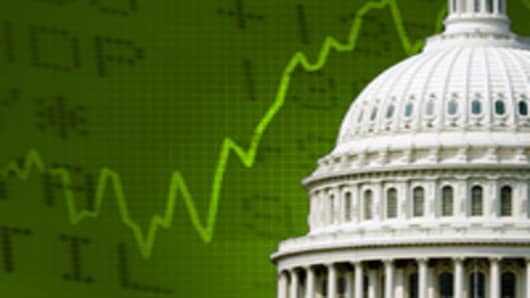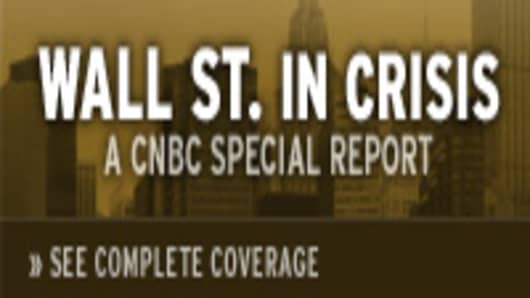After government takeovers of individual firms in recent months failed to stop spreading credit turmoil, U.S. authorities are turning their focus to part of the underlying problem -- the rising tide of bad mortgage debt choking the financial system.
The draft legislation said Treasury could hire asset managers to handle debt purchases, which could include residential or commercial mortgages and related instruments that were originated or issued on or before September 17, 2008.
The authority to purchase ends two years from date of enactment, but the authority to hold the assets would continue.
Banking industry sources said "reverse auctions" would be held to purchase $50 billion tranches of debt, which could include residential and commercial mortgages and mortgage-backed securities. But that level of detail was not spelled out in the draft legislation.
A Treasury official said Friday that hedge funds would not be eligible to offload troubled assets under the plan, but that was not explicit in the draft legislation.
Congressional committees were to be briefed on Saturday on the legislation, which could be considered by the U.S. House of Representatives and Senate as early as next week.
Democrats have said they might try to use the financial bailout legislation to reduce home foreclosures and put some limits on the pay of corporate chief executives.
"We must not forget Main Street as we work to address the crisis on Wall Street," Senate Majority Leader Harry Reid, a Nevada Democrat, said on Friday.
The financial crisis has dominated the U.S. presidential campaign this week with Republican Sen. John McCain Barack Obama skirmishing over the proper government role.
And some members of Bush's Republican Party are upset with the government's increasing involvement in the private sector.
"The free market for all intents and purposes is dead in America," said Kentucky Sen. Jim Bunning. The Treasury proposal would "take away the free market and institute socialism in America," he said in a statement on Friday.
But financial markets have shown their approval and may be disappointed if Congress does not swiftly back the measures.
U.S. stocks had their best day in six years on Thursday on talk of an aggressive plan. On Friday the Dow Jones industrial average <.DJI> rose 368 points, or about 3.4 percent.
The Treasury and Federal Reserve have already put nearly $1 trillion of taxpayer money on the line to help credit flows.
And banks worldwide have suffered more than $500 billion of write-downs and loan losses since the global credit crisis began more than a year ago.
The crisis grew more acute this month with government takeovers of mortgage companies Fannie Mae and Freddie Mac; the bankruptcy of Lehman Brothers Holdings; Merrill Lynch's shot-gun agreement to be bought by Bank of America; and a bailout of insurer AIG. This came just six months after a government-backed rescue of Bear Stearns.
The plan to buy back mortgage-related debt was just one of a series of measures unveiled in the last two days as the Treasury and Fed decided the frozen credit markets signaled a growing storm that would engulf the economy.
The Treasury said on Friday it would siphon up to $50 billion from a fund established in the 1930s to conduct foreign exchange market intervention to backstop the rattled U.S. money market mutual fund industry.
This long-safe corner of financial markets, home to some $3.5 trillion of deposits, has increasingly appeared at risk of falling victim to the year-old credit crunch. Money market fund assets dropped by a record $169.03 billion in the week ended September 17 as jittery investors pulled money out.
The U.S. Securities and Exchange Commission got involved too, imposing on Friday a 10 trading-day ban on short sales of 799 financial stocks.
And the administration will step up a program announced this month to directly buy mortgage-backed securities in the market, and said Fannie Mae and Freddie Mac would also increase their buying to try to get credit flowing.
Bush said he initially thought the government could deal with the trouble on Wall Street "one issue at time."
But the financial "house of cards was much bigger, and it started to stretch beyond just Wall Street in the sense of the effects of failure," he said at a White House event with Colombia's President Alvaro Uribe on Saturday.
—Reuters contributed to this report



